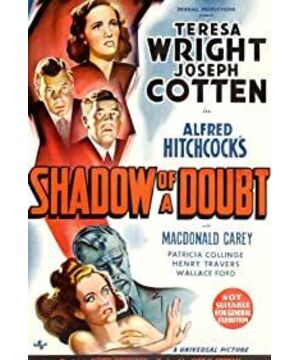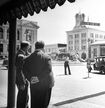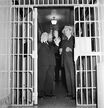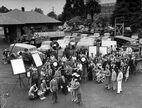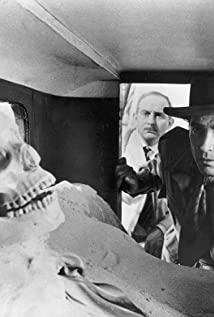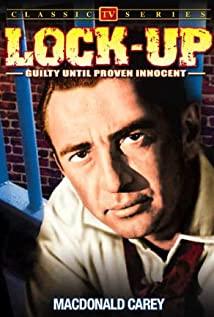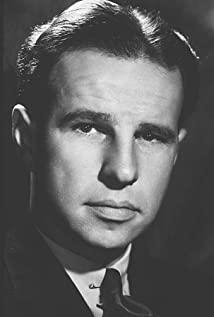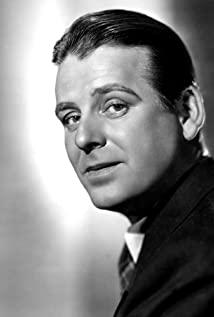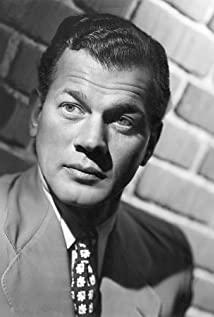Copyright description: The content comes from the Internet, this article is only for sharing, the copyright belongs to the original author, if there is any infringement, please inform, contact to delete
(The following full text is reproduced in WeChat original Wang Haocheng Arkie 2017-07-27 )
Shadow Of A Doubt (1943)
Uncle Charlie, portrayed in Hitchcock's "The Voice," is perhaps the most charismatic villain in his films. With the image of a vampire, he successfully escaped the pursuit of detectives in the eastern city, and with a strong personal charm, came to the home of his middle-class sister Emma in a small town on the west coast.
We are always complaining about those wicked people, saying the sweetest and sweetest words every day, but we never thought that, like Hitchcock's "The Voice of Doubt", using a person with the most evil personality but pretending to be the most powerful Characters of Nurtured Character, "Subtly Undertaking a Socio-Political Critique" (from Hitchcock's Films). Instead of really substituting a vampire character for the "social and political moment"—the turbulent early '40s America's middle class experienced, he preferred to add to the seemingly sincere (albeit very evil) people With vampire-related elements (shadowing, telepathy, possessing demonic powers, etc.), this man actually embodies the worst of the times.
Uncle Charlie's charisma and virtue disguised as a cultured personality permeates this society with spiritual fear. Little Charlie remained silent. She was afraid that the exposed evil of Uncle Charlie would hurt her mother's impression of her brother's purity from beginning to end. Little Charlie's uncle, Uncle Charlie, is the mother's greatest spiritual comfort, and the changes in society that the American middle class has felt for 40 years, Little Charlie really feels it. Children shouting disrespectfully; life's pressures keeping mothers busy, even though it's from little Charlie's mouth; rude neighbors always interrupting at dinnertime; and so on. The film maintains the necessary distance between psychological fear and spiritual comfort, thereby promoting dramatic tension.
And when Little Charlie appeared in the movie, like her telepathic uncle, she was lying on the bed weakly, almost paralyzed. Uncle Charlie's incestuous encounter with little Charlie seemed to save them both at the same time, but in fact pushed them both into a life-and-death battle. Little Charlie had tender pity for the intrusion of the evil world Uncle Charlie represented, and she wanted Uncle Charlie to leave this place to preserve his reputation and the good pretense he left to his mother. The world should not be killing the old in order to usher in the new. But when Uncle Charlie was no longer regarded as a suspected criminal, his chance to turn his back came. He could very well carry on with his good name and appearance, except that little Charlie knew who he really was. He exposed himself a little too impatiently. The only way out is to kill little Charlie. So, Uncle Charlie set up all kinds of unexpected accidents to happen. Hitchcock strictly controls the dimension and direction of the story. Little Charlie's death is unbelievable, just like the accidental death of Uncle Charlie. But the happy ending depends entirely on the director's moral height. Hitchcock mischievously lets Uncle Charlie fall from the speeding train symbolizing the phallus, but little Charlie, who he tries to push off the train, is accidentally saved. Let's put it this way: the old evil world died on its own, preserving its name. It's just sarcasm, naughty sarcasm.
The invasion of the real world into the false world is like a dream. This dream really opened up little Charlie's new worldview, which was what she was eagerly looking forward to at the beginning of the film in her utter depression! She didn't know what the consequences she was eagerly looking forward to, but the consequences made her realize the real evil of the world, and she was just an accidental saver of evil.
Between character and personality, Hitchcock goes to great lengths to express his moral anxieties. Just like the dizzying dance steps of the pas de deux with the background music of "The Merry Widow" at the beginning of the film, it makes a comeback several times in the subsequent episodes, heralding the most graceful and beautiful character. However, there is murder behind it. Hitchcock also repeated this theme between the gentleman who established the evil character and the good character in "The Jamaica Inn." People always build great personal charm and do all kinds of things that hurt the world. This is the greatest convenience that can be obtained by relying on the times and society.
In "The Voice of Doubt", Uncle Charlie uses unconscious and fierce words to criticize social and political science between the evil character and the elegant personality (you can imagine the most elegant charm that the women he criticized can have) : The city is full of women who are a group of middle-aged widows whose husbands have died and who have accumulated wealth for them with their lives and their labors. They died and left their property to their stupid wives. What are these women doing all day long? In and out of the restaurant, the most advanced restaurant, thousands of women every day, they eat money, drink money, lose money, win money, smell money. They love nothing but their proud jewelry, these horrible, rotten, greedy, fat women…. In addition, Uncle Charlie said to little Charlie: You are living in a dream. You are a sleepwalker and can't see anything. Do you know the real face of the world? Did you know that the world is a dirty pigsty and you walk out of the front yard of your house and smell the stench? The world is a hell, and it doesn't matter what happens in hell. Wake up, little Charlie, use your brains and gain insights.
The role of mother Emma, in the character mask other than the evil personality, expresses the deepest and most painful condolences and nostalgia for the past life. She is always the most indifferent to the present world, and she always lives in the past, just like the childhood that human beings can never get out of. Emma's younger brother, Uncle Charlie, was her eternal sweet dream. What about the past world and the present world? Whether the world is a hell is the same for her. She was living in a dream, the one who never woke up in the end. Most people are also the one who can't wake up. However, she knew that the old world would never come back, and Uncle Charlie's claim to be leaving only stinged her temporarily, making her mourn the old world with its sweet character. That world is Uncle Charlie's counterpart. Just when Uncle Charlie suddenly said that he was going to leave, it was also the most tear-jerking climax of the plot. Uncle Charlie merged with that old world. This evil killer with the color of the vampire Dracula entrusts the best past in her life, the classical world constructed by character and virtue.
Little Charlie had to bury the evil Uncle Charlie with a heavy heart, as his mother Emma, and listen to the whole town give their saddest eulogy: His pure character . . . the sweetness of character will live with us. live. Their pain will pass, but little Charlie's dream wakes up. I thought, how can anyone go back to the past after such a vicious murder? She is like Frodo in The Lord of the Rings, only walking forward soberly, knowing that the world is a hell, so what?
Hitchcock had the same moral anxiety as Tolkien: the world is changing, and no matter how strong an individual's charisma is, it can't save the moral depravity, that is, the loss of pure and beautiful character (perhaps there are no such things at all). Existed, but only in the fantasies of people who continue to deepen their sense of disappointment). However, Uncle Charlie has won the general respect of the town with his strong personal charm. It's a terrifying thing to think about, "and embodies the futility of a young woman trying to find comforting order in an irrational world."
View more about Shadow of a Doubt reviews


